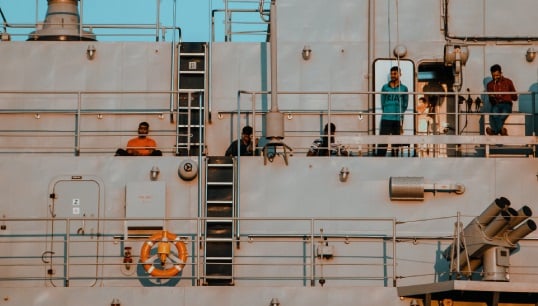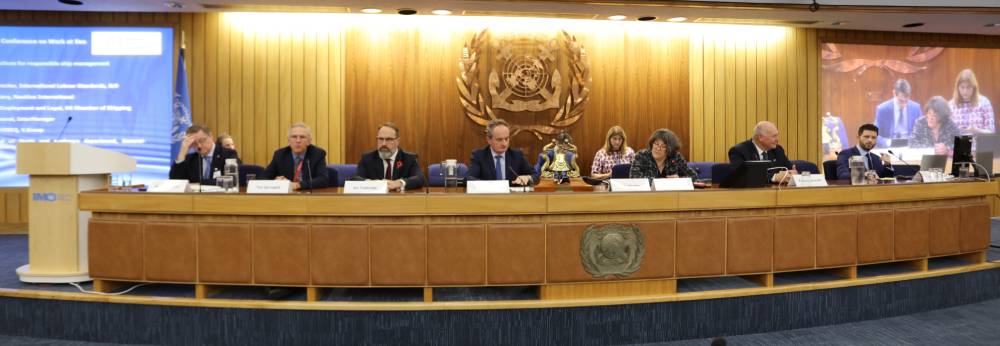- Topics
- Campaigning
- Careers
- Colleges
- Community
- Education and training
- Environment
- Equality
- Federation
- General secretary message
- Government
- Health and safety
- History
- Industrial
- International
- Law
- Members at work
- Nautilus news
- Nautilus partnerships
- Netherlands
- Open days
- Opinion
- Organising
- Podcasts from Nautilus
- Sponsored content
- Switzerland
- Technology
- Ukraine
- United Kingdom
- Welfare

Nautilus general secretary Mark Dickinson recently announced to a top-level maritime safety conference that a revised version of the ITF Manning Policy is on the way this year. Andrew Linington explores what the policy is all about, and how it will improve seafarer safety
Nautilus is at the forefront of a new drive to encourage ship owners and managers to run 'best practice' operations, abiding to global standards governing the way in which their vessels are crewed.
In November 2023, general secretary Mark Dickinson told a joint conference of the International Maritime Organization and International Labour Organization (IMO/ILO) that the industry needs to end the longstanding and damaging competition among flag states to offer the lowest possible crewing levels.
At the heart of the campaign to combat poor practices is a new version of the International Transport Workers' Federation (ITF) Manning Policy – developed with the aim of making sure that ships have sufficient seafarers onboard to meet the reality of modern-day operations.
The new policy – which is set to be adopted at the ITF Congress in October 2024 – was endorsed by the ITF Seafarers' Section conference in Santiago in December 2023. It will form a central element of the agreements the Federation puts in place to enforce decent wages and conditions onboard flag of convenience ships.
It's the first time in more than 20 years that the ITF Manning Policy has been overhauled, and work on the review was approved in 2018, with a focus on the analysis of how practical and effective the previous policy had been.
The latest thinking on safe crewing levels
The review also examined new research into safe crewing levels – much of it drawing from the experience of seafarers at the sharp end – and also assessed the impact of new technologies and automation.
Although the ITF Manning Policy working group was affected by the disruption caused by the Covid pandemic, it managed to complete its work in 2020. The proposals have subsequently gone before the Federation's Maritime Safety, Seafarers' Section and Fair Practices Committees for further input before the final version goes to the ITF Congress for approval.
ITF affiliate unions such as Nautilus see the new policy as being particularly significant because it is directly linked to international regulations – including the STCW and Maritime Labour Conventions, safety management and security codes, as well as collision prevention and safety of life at sea rules.
The ITF says it is not safe to operate with a lone officer in charge of the navigational watch during periods of darkness or reduced visibility, and the certified deck watch/lookout ratings should be part of the crew to maintain a three-watch system
During the Manning Policy review work, it was noted that the IMO minimum safe manning principles provide a decent platform for regulating crewing levels – but the problem has been the effective implementation of the rules. By basing the new ITF policy on such regulations, it is hoped that there will be greater common understanding and cooperation between ITF ship inspectors and port state control authorities to ensure that proper standards are in place.
Putting seafarers at the centre of safety assessments
The new policy is divided into two parts – one dealing with the general principles and the second setting out specific guidelines for different types of ship. At the heart of the policy is the principle that humans should be at the centre of any developments, with all ships covered by ITF-approved or national agreements being 'sufficiently, effectively and efficiently' crewed to ensure:
- safety and security of the ship, safe navigation and operations at sea
- safe operations in port
- prevention of human injury or loss of life
- the avoidance of damage to the marine environment and to property
- the welfare and health of seafarers through the avoidance of fatigue
Companies responsible for the operation of a ship should develop their crewing levels based on an assessment of the tasks, duties, competence and responsibilities required for safe operations, security of the crew and protection of the marine environment – as well as for dealing with unforeseen events or emergency situations. This analysis should involve trade union and safety representatives.
A broader understanding of vessel operations
To avoid the risk of excessive working hours and fatigue, companies will also have to Identify all the functions to be undertaken onboard during a representative voyage or operational period, and to determine how many crew would be needed to undertake the relevant tasks and duties under both peak and routine workload conditions.
The policy says safe crewing levels should take into account such factors as:
- the size and type of ship
- the number, size and type of main propulsion units and auxiliaries, and high voltages
- the level of ship digitalisation, automation and complexity
- construction and equipment of the ship
- method of maintenance used
- cargo to be carried
- frequency of port calls, length and nature of voyages to be undertaken
- trading area(s), waters and operations in which the ship is involved
- extent to which training activities are conducted onboard
- catering needs
- watchkeeping arrangements
- duties in connection with cargo handling in port and at sea
It sets out detailed elements to be considered for the safety of navigation, engineering, cargo operations, electrical, electronic and control engineering, radiocommunications, maintenance and repair, and the safety and security of the ship and all onboard.

Nautilus general secretary Mark Dickinson (left of picture) spoke about the new ITF Manning Policy as part of an ILO/IMO conference session with fellow panel members Tim Springett of the UK Chamber of Shipping, Kuba Szymanski of InterManager, Ian Trebinski of V.Group, and Christophe Lenormand of France's General Directorate for Maritime Affairs, Fisheries and Aquaculture. Image: IMO
Overhauling the watch system
The policy stresses the importance of adopting a three-watch system to ensure that masters and chief engineers are not asked to stand regular watches. The ITF does not consider it safe to operate with a lone officer in charge of the navigational watch during periods of darkness or reduced visibility, and the policy states that the certified deck watch/lookout ratings shall be part of the crew to be able to maintain a three-watch system.
The new policy also notes the diverse working patterns and operational cycles of certain ship types and says companies need to ensure that their crew complements reflect the particular working pattern, rotation and/or work schedules of seafarers, the particular operational requirements of a ship or group of ships, and any call-out requirements of a port, harbour or other organisation.
Special attention should be paid to the crewing requirements of offshore vessels, tankers and passenger and ro-ro ships, it adds.
Plans to modernise terminology
At a time when so much work is going into breaking down gender barriers at sea, the question arises of why the term 'manning' has been used for the policy. Nautilus head of international relations Danny McGowan has the answers: 'The name has been kept as the ITF Manning Policy, rather than "Crewing Policy", in order to align with IMO naming conventions and references to the policy.
'The ITF is conscious that the term crewing should be used where possible and will work to ensure that the necessary alignments are made to enable it to be renamed when possible.'
A campaign tool for safety at sea
Mr Dickinson said the new policy represents an important step forward and offers the shipping industry a valuable opportunity to end the pernicious 'race to the bottom' on crewing. 'It is also an important policy is the IMO context, when the ITF pushes for attention to be paid to fatigue and the long hours culture,' he added.
It is also hoped that the new policy will provide ITF affiliates with an effective platform for lobbying nationally, addressing minimum safe manning requirements, and influencing company-level negotiations on such issues as safety management and working hours.
Tags
More articles
Nautilus speaks out for seafarer safety at major IMO/ILO conference
Nautilus general secretary Mark Dickinson has called on governments, shipowners and maritime unions to form a 'coalition of the willing' to learn the lessons of Covid-19 and deliver a new social contract for seafarers
